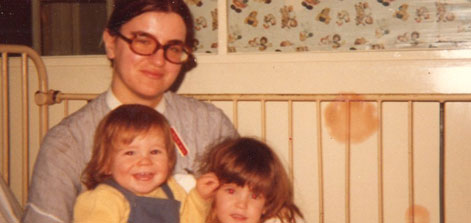"Whatever the differences between the NHS in 1970s and today, one thing remains the same – we need to protect it."
Sarah Beeson MBE, an author and health visitor with over 40 years of experience, is worried about the future of our much-loved institution. Here's why...
Sarah Beeson MBE
We need to protect our NHS
Posted on: Thu 10-Nov-16 11:51:16
(77 comments )
Life is certainly better for patients today who are being treated for cancer, trauma or receiving a transplant – the technology and treatment now available with the NHS was unimaginable when I wore a nurse's cape and cap. But something my readers often point out is that in both hospitals and community healthcare there was more freedom to care individually for patients.
The size of today's NHS is massive and every day thousands of patients in hospitals, clinics, GP surgeries and in the community are seen. As our population grows and people live longer so the demand on the NHS increases but that doesn't mean we should think of patients as numbers, budgets and ailments – they are people who deserve not just our care but our time – and it is often time that is in the shortest supply.
In the early 1970s, I trained as a nurse at Hackney Hospital in the East End of London. It was, like many NHS hospitals, rather old fashioned and parts of it had been The Workhouse. I recall one elderly lady getting terribly distressed as she remembered it as such, and in her confusion thought she was being sent there to die. On that ward not every nurse was kind and caring. Just like today, some were angels of mercy and some were dismissive, rude and at times cruel in their lack of compassion for their patients.
We worked on Nightingale wards organised in long rows with a desk at the top and a small office for Sister. Florence Nightingale's maxim that 'Every patient was an honoured guest,' still held true. Matron, Sisters and Charge Nurses were sometimes fearsome, but at the top of their profession, and taught us by example in the hospital and not at a university. We learnt at Nelly's Elbow and our classrooms for lectures and teaching were in a block on hospital grounds. We lived all in, room and board in the nurses' home and there was a great sense of community and belonging.
Decisions are increasingly made not in the interests of those patients but by politicians, policy-makers and managers who sometimes seem to outweigh the numbers of staff actually delivering the service.
From these strong women we learnt to be confident, capable and, most importantly, compassionate nurses. But not everyone made it. Fifty girls started with me in Preliminary Nurse Training in January 1970 and when we'd finished our training three years later and lined up in Matron's office to be handed our frilly nurse's caps only six student nurses were left, the rest having realised nursing wasn't for them and dropped out or else they'd failed part of the training and left.
By today's standards we were exploited. We worked 55 hour weeks with only one day and a half day off (not to be taken consecutively) and we had huge responsibilities. Our patients often suffered from symptoms I'm thankful we see less of today thanks to better housing, education and immunisation but there was a simplicity to the work and value placed on the nursing profession that I fear is being eroded by an under-resourced NHS that is not respected by the state that funds it.
When I started health visiting in the mid-1970s in rural Kent I had a big caseload (800 families and counting!) but I also had the freedom to give the time and care my mothers and families needed, which went far above and beyond the prescribed service.
The role that you play as a health visitor to each family is very different. Some mums need breastfeeding support, others might be going through a divorce. I had the freedom to shape my own practice around my mothers' needs. It's much harder for health visitors to do that now there are so few of them and so many families, and a lack of understanding from funders about the important work they can do.
We are losing experienced health visitors through redundancy. In March and April this year, 433 health visitors were lost from the service. There are now only 9,711 health visitors left, and last year 697,852 babies were born in England and Wales. If the cuts go ahead there will be even fewer health visitors, and the service I've worked in for over four decades will be lost. Once it's gone, there's no way to get it back.
Today's government doesn't listen to the dedicated NHS staff who are on the frontline caring for patients. Decisions are increasingly made not in the interests of those patients but by politicians, policy-makers and managers who sometimes seem to outweigh the numbers of staff actually delivering the service.
It is the principle of giving all people in the UK access to free health care at the point of need that makes the NHS one of the most important, if not the most important, service the British people have. Everyone needs the NHS and you never know when your hour of need will come. Whatever the decade, we need to protect it.
Sarah is the author of several books, including The New Arrival, chronicling her training in Hackney, and Our Country Nurse, a memoir of her time as a health visitor in a small country village. They are both published by Harper Element and available from Amazon.



